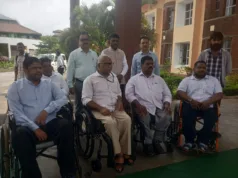The Comptroller and Auditor General of India (CAG) today presented three significant audit reports before the Goa Legislative Assembly, providing a comprehensive evaluation of the State’s financial management, compliance with statutory provisions, and welfare programme implementation. The reports tabled are the Compliance Audit – Civil & Commercial (Report No. 1 of 2025) for the year ended 31 March 2022; Performance Audit on Welfare of Building and Other Construction Workers (Report No. 2 of 2025) for the year ended 31 March 2023; and State Finances Audit Report (Report No. 3 of 2025) for the year 2023-24.
1. Compliance Audit – Civil & Commercial
The audit assessed major schemes and compliance functions of the State Government. Key observations include:
•Swadesh Darshan Scheme (Tourism Development): Project identification and execution under the Coastal Circuit-I were inconsistent with scheme guidelines. Assets such as parking areas and helipad sites faced planning lapses, non-utilisation, or abandonment due to poor coordination with local bodies.
•National Social Assistance Programme:
Goa did not receive central assistance from 2016-17 to 2021-22 due to non-utilisation of funds and non-submission of utilisation certificates, depriving eligible beneficiaries of pensions.
•GST Oversight: Systemic deficiencies in monitoring tax compliance were found, including failure to cancel non-filer registrations and high incidence of mismatches in returns, involving ₹46.30 crore in deviations.
•Other Notable Findings: Loss of ₹45 lakh to the Corporation of the City of Panaji due to non-renewal of advertising agreements; road works worth ₹86.81 lakh carried out on private properties without cost recovery; and misappropriation of funds in Public Works and River Navigation Departments due to weak internal controls.
2. Performance Audit – Welfare of Building and Other Construction Workers (BOCW)
The audit examined the effectiveness of the BOCW Act implementation in Goa. Findings include:
•Delayed Implementation: State BOCW Rules and cess collection began after a 12-year delay, and key advisory bodies were constituted late, hampering governance.
•Weak Registration & Monitoring: Only 75 out of 1,169 construction sites (2017-22) were registered as required. Poor coordination between licensing and registering authorities led to non-compliance.
•Cess Collection Issues: Village Panchayats began cess collection only in 2021-22, significantly reducing funds for worker welfare. Cases of delayed or non-remittance of cess were reported.
•Worker Safety & Welfare: Inspections were inadequate, with common lapses like lack of safety gear, canteens, or accommodation. Several welfare schemes were never implemented; social audits mandated by the Supreme Court were not conducted.
•Financial Management Gaps: No annual accounts since 2018-19, no internal audits, vacant key finance posts, and poor fund utilisation due to parking in low-interest savings accounts.
3. State Finances Audit Report (2023-24)
The financial performance and accountability of the State Government were reviewed. Key highlights:
•Economic Indicators: Goa’s per capita GSDP in 2023-24 was ₹6,74,684—over three times the national per capita GDP.
•Revenue Trends: After deficits in 2019-21, Goa posted revenue surpluses in the last three years, though ₹3,027.52 crore in utilisation certificates remained pending as of March 2024.
•Debt Management: Outstanding debt, including ₹706 crore in off-budget borrowings, stood at ₹33,573 crore (29.93% of GSDP), exceeding the 25% limit set under the Goa FRBM Act.
•Budgetary Issues: Gross savings of ₹6,372 crore represented 22% of total provisions; large portions of supplementary grants proved unnecessary. Excess expenditure of ₹12,625 crore from 2008-09 to 2022-23 remained unregularised.
•Quality of Accounts: Persistent use of “Minor Head 800 – Other Expenditure” and significant pendency of contingent bill settlements raised concerns over transparency.
•Fraud and Misappropriation: 33 cases involving ₹4.90 crore were pending action, with some over a decade old.






